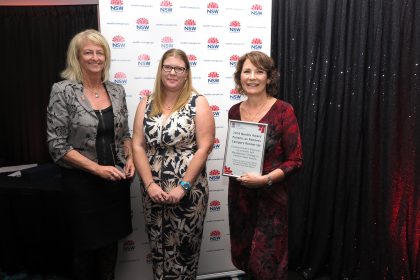
The judging panel had some tough decisions to make at this year’s NNSW LHD Quality Awards. Two Integrated Care finalists made it through to present at the Quality Awards Presentation Dinner at The Twin Towns Services Club on Friday 15 June. One of those finalists was Flexible Diuretic Regimens as a Patient Self-Management Strategy in Chronic Hear Failure, Kerry Wilcox and Francesca Leaton
Francesca Leaton, Registered Nurse, Community Nursing Tweed and Kerry Wilcox, Cardiac and Chronic Disease Services Manager submitted their project under the Category: Patients as Partners with acknowledgments to the team involved. This included Dr. Greg Fairbrother, Sydney/Southern Cross Uni, Dr. Diane Blanckensee, Tweed Health for Everyone Superclinic and Kelli Babovic, North Coast Primary Health Network.
The work being showcased centred around patient empowerment, teaching self monitoring strategies and good communication between health care providers is the key to assisting patients to manage their illness and stay well at home. Heart Failure patients often present to hospital because they become unwell at home over a period of days or weeks, but don’t recognize this slow deterioration and don’t know when to get help.
This intervention improves clinical outcomes and reduces hospitalisation in Heart Failure Clinics in metropolitan hospitals however it is not implemented in regional and rural areas that lack access to dedicated Heart Failure outpatient clinics.


Innovation & Originality: The Daily Fluid Management Book
Action Based research improved the use of Flexible Diuretic Regimens and self management in Tweed.
A patient held booklet was created that was:
- Designed with patients /for patients/using health literacy principles (improving since 2012).
- Patient record keeping tool (weight/symptoms),
- Shared decision-making through patient-centred action plan & medication adjustment (flexible diuretic regimen)
- Contained an interpretation of the big words clinicians used
- Communication tool between patients/GPs/ clinicians/services.
- The Flexible Diuretic Regimen, incorporated into a Daily Fluid Management Book, is an early intervention self-management tool.
- Designed by heart failure patients with GPs, Physicians, Nurse Practitioners and other clinicians.
- Support patients to identify the early warning signs of fluid retention.
- Activate a personalised step-by-step diuretic self-management action plan.
- In response to specific weight gains of 2kgs over 1 – 3 days.
Four clinical audits involving heart failure admissions demonstrated continued implementation of inpatient flexible diuretic regimens at Tweed hospital from 4% at six months to 40% at 24 months. This increase was accompanied by a Statistically significant halving of the average number of fluid-overload related heart failure admissions, when the 2nd 12-month period was compared with the 1st 12-month period (p = 0.0001).
Sustainability & Transferability
Currently the numbers of Flexible Diuretic Regimens in Tweed alone is over 320. These are being rolled out further across the LHD by Heart Failure nurses, Cardiologists, Nurse Practitioners (Cardiac and Renal) Hospital and Community Nurses, GPs and Practice Nurses.
This initiative supports NNSWLHD and NCPHN ‘Winter Strategy’ and ‘Leading Better Value Care’ in keeping heart failure patients well at home. The process is embedded in Heart Failure ‘HealthPathways’, incorporated into an ‘Acute Heart Failure Clinical Pathway’ at the Tweed, Grafton and Maclean Hospitals to date, with roll out to other hospitals progressing. There is a standardised education program for community and hospital staff, GPs and practice nurses.
“This research project has enabled me to participate with an amazing team of incredibly talented people, sharing ideas, learning new skills and developing real connections. These connections have been so important to me both professionally and personally” Says Francesca of the whole process as she looks forward to future opportunities to enhance these valuable partnerships.
